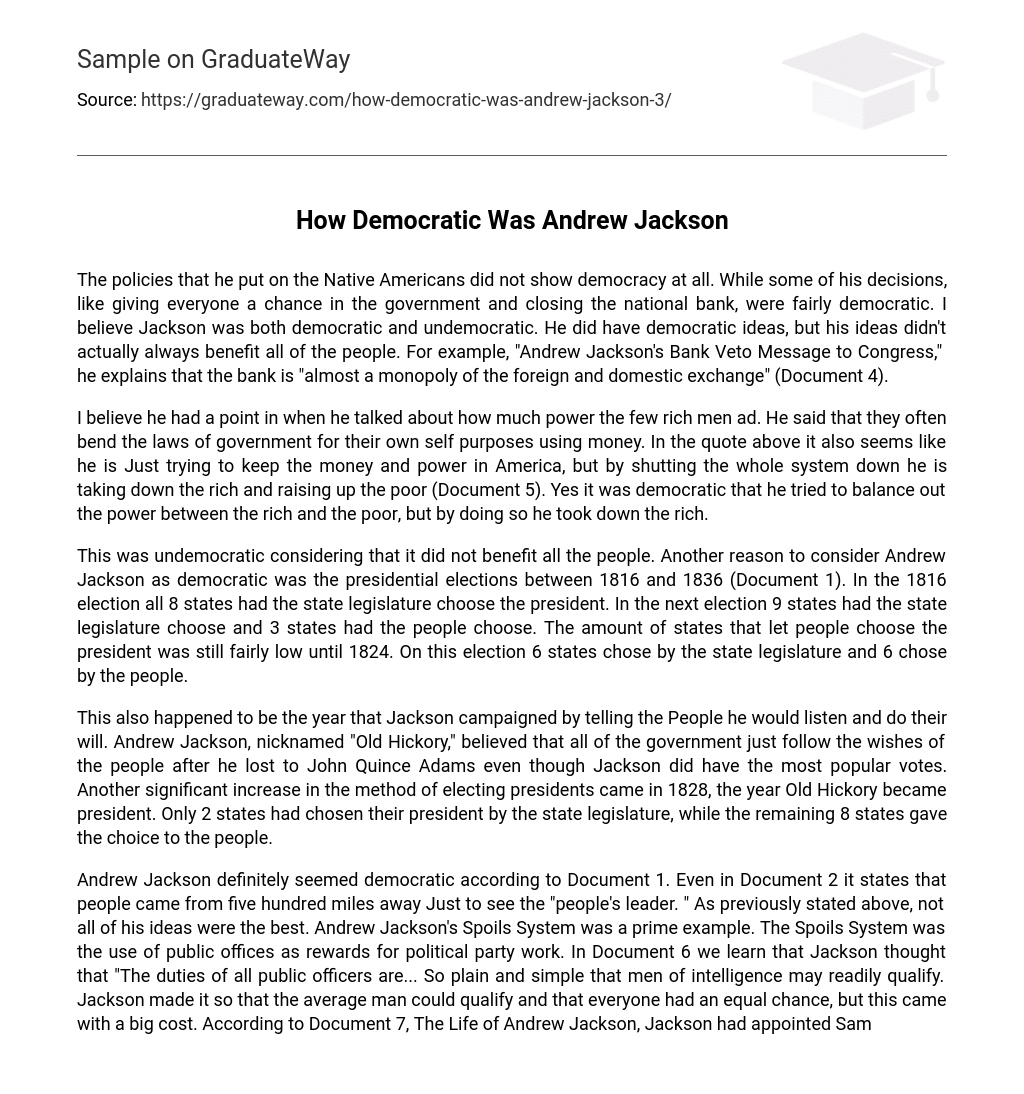Despite some of his decisions being fairly democratic, such as giving everyone a chance in the government and closing the national bank, the policies imposed on Native Americans by Andrew Jackson did not reflect democracy at all. While he had democratic ideas, it is arguable that they did not always benefit all of the people. In his “Andrew Jackson’s Bank Veto Message to Congress,” he points out that the bank is essentially a monopoly in the exchange market, including foreign and domestic (Document 4).
The text affirms that a select few affluent individuals possess an inordinate amount of power and exploit government legislation for their own benefit with their financial means. The individual in question desires to maintain wealth and influence within the United States, yet by disrupting the entire system, they are dismantling the wealthy while empowering the less privileged (Document 5). Despite their democratic endeavor to establish equilibrium between the rich and the poor, it led to the downfall of the prosperous class.
The lack of democracy in this situation was evident as it did not benefit everyone. Andrew Jackson’s commitment to democracy can also be observed in the presidential elections held between 1816 and 1836 (Document 1). During the 1816 election, the president was selected by the state legislature in all eight states. In the subsequent election, nine states relied on their state legislatures while only three states allowed for popular choice. However, it wasn’t until 1824 that a significant number of states began permitting citizens to directly choose their president. In that election, six states were decided by state legislatures, while an equal number of six states made their decision through a popular vote.
Andrew Jackson campaigned for the presidency in 1828, vowing to heed and satisfy the desires of the people. Despite winning the popular vote, John Quincy Adams emerged as the ultimate victor. Nonetheless, Jackson staunchly advocated for a government that adheres to its citizens’ will. This election year also witnessed a notable shift in presidential selection methodology. Merely two out of ten states relied on their state legislature for appointing presidents, while the remaining eight permitted popular choice.
According to Document 1, Andrew Jackson appeared to be truly democratic. Document 2 even mentions that people traveled from five hundred miles away just to see the leader who was considered the “people’s leader.” However, as previously mentioned, not all of Jackson’s ideas were commendable. A prime example of this is his implementation of the Spoils System, which involved using public offices as rewards for political party work. Document 6 informs us that Jackson believed that the duties of public officers were simple enough for intelligent individuals to easily meet the qualifications. Jackson aimed to make it accessible for the average person to qualify and to provide equal opportunities, but this came at a significant cost. Document 7, The Life of Andrew Jackson, recounts an incident where Jackson appointed Samuel Squawroot as the collector of the Port of New York. When Vice President Van Burden discovered that Squawroot was a criminal, he alerted the President. However, Jackson refused to listen and allowed Squawroot to keep his position due to their past support. Jackson was horrified when it was later revealed that Squawroot had stolen $1,222,705.09 and fled to Europe.
It was democratic to provide equal opportunities to everyone, but there should be certain limitations. However, after losing a million dollars, it was without a doubt undemocratic. A genuine democratic leader advocates for equality among all individuals, which Andrew Jackson somewhat embodied. Although Jackson offered equal opportunities to everyone, he excluded Native Americans and slaves as he did not consider them citizens. In Document 8, Jackson initially appears to acknowledge the land loss of Native Americans, but later suggests creating a separate area for them.
The Native Americans expressed their desire to stay on their ancestral land as stated in Document 9. Although Andrew Jackson may have believed he was being fair and equal, they did not want to relocate. Jackson, disregarding democratic principles, implemented a law that allowed for the forced removal of the Native Americans. This is illustrated in Document 10. In conclusion, I believe that Andrew Jackson demonstrated both democratic and undemocratic attributes during his presidency, depending on the context.





